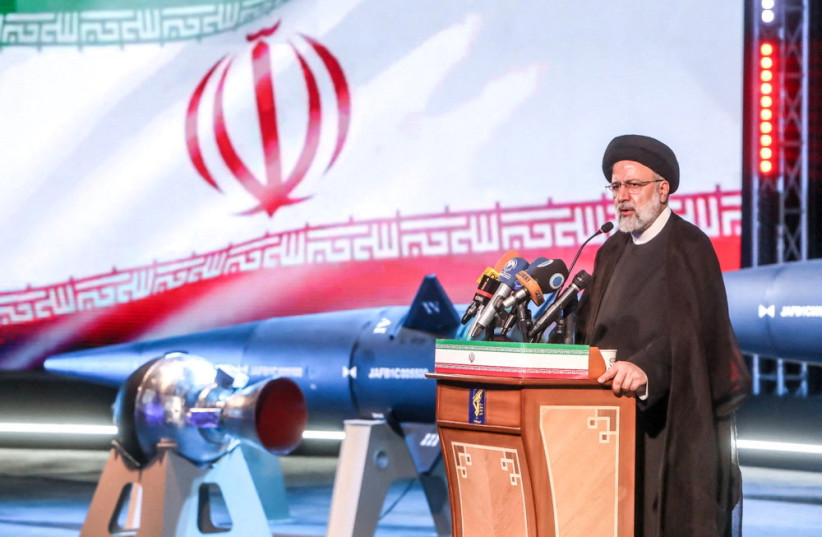On Tuesday, Iran introduced the “Fattah”—a new hypersonic missile that marks a significant advancement in the country’s ballistic capabilities. The introduction of the missile puts Iran in the company of only a select few nations with the technological expertise necessary to produce such a weapon. Israeli experts have expressed skepticism about the authenticity of Iran’s claim while cautioning that Israel and its allies should remain vigilant about Iran’s nuclear program.
For more stories from The Media Line go to themedialine.org
Regardless of whether Iran has actually produced the hypersonic missile at this point, experts say that the pursuit of such a weapon is something Israel ought to watch closely.
Iranian President Ebrahim Raisi attended the missile’s unveiling ceremony together with other top figures in the Islamic Republic, including Iranian Revolutionary Guard Corps Commander in Chief Hossein Salami. Iranian media released footage reportedly displaying a test launch of the missile later that day. Banners displaying the phrase “400 seconds to Tel Aviv” were displayed throughout Tehran after the unveiling ceremony.
The development of the hypersonic missile was first announced in November.
Or Yissachar, national security researcher at the Israel Defense and Security Forum, told The Media Line that the missile’s development would represent a significant achievement for Iran. He noted, though, that Iran was not “a fierce advocate of truth” and that the story therefore may not be authentic.

Yissachar characterized Iran’s aspiration for the hypersonic missile as an attempt to position the country as a significant regional actor. The US, Russia, China, and North Korea all claim to have hypersonic missiles as well.
Successfully obtaining a hypersonic missile would allow the Iranian military to bypass Israeli air defenses due to the missiles’ speed and ability to change course, Yissachar said. “But I personally believe that Iran has a little way to go until it attains such weapons,” he noted.
Skepticism about Iranian claims
Iran’s development of nuclear weapons presents a more serious threat to Israel than hypersonic missiles do, Yissachar said. Although the details and authenticity of the Fattah announcement are still unclear, “I do know that Iran is just a heartbeat away from obtaining nuclear weapons,” he said.
Iran has nearly 200 pounds of 60% enriched uranium, an enrichment level for which there is no civilian use. According to International Atomic Energy Agency reports, Iran is three weeks away from having enough fissile material for one nuclear weapon and three months away from having enough material for up to seven nuclear weapons, Yissachar said.
Security expert Danny Citrinowicz, a research fellow at the Tel Aviv-based Institute for National Security Studies, expressed similar skepticism about the authenticity of Iran’s claim. But “when the Iranians put some sort of a target in front of them, we know they will try their best in order to reach their target,” he told The Media Line.
Even if Iran has not yet produced a hypersonic missile, it behooves Israel to take their stated objective seriously, Citrinowicz said.
He noted that increased cooperation between Iran and Russia, a country that has also claimed to possess hypersonic missiles, may play a role in Iran’s weapons development. “We cannot rule out the possibility that the Russians will help them as payback for the Iranian help in the war in Ukraine,” he said.
Citrinowicz said that Israel will likely be able to develop an air defense system capable of managing the threat.
“Looking at Israel’s history, I’m sure that our scientists will find a solution for that. … We know where Iran is aspiring to, and we know what to prepare,” he said.
